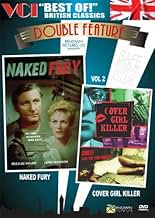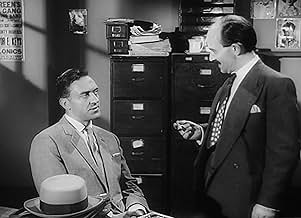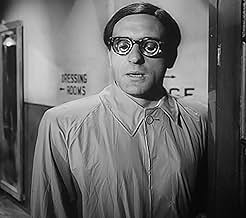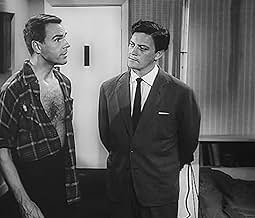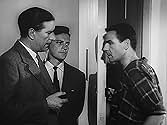Set in the sleazy world of a backstreet 1950s nightclub, a serial killer is believed to be murdering the models of a glamour magazine.Set in the sleazy world of a backstreet 1950s nightclub, a serial killer is believed to be murdering the models of a glamour magazine.Set in the sleazy world of a backstreet 1950s nightclub, a serial killer is believed to be murdering the models of a glamour magazine.
Frank Barringer
- Detective
- (uncredited)
- Director
- Writer
- All cast & crew
- Production, box office & more at IMDbPro
Featured reviews
A weirdo approaches the stage door of the Casbah Club, in 1950s Soho, and is transfixed by a portrait of Miss Gloria Starke (Bernadette Milnes, who pops up in the opening scene of Cover Story, a Sweeney episode, fifteen years later - if you're interested, like).
This is a film by Butchers Film Distributors (at least, I think it is IMDb lists it as Jack Parsons Productions) and it's a film on a different level, theme wise, to almost every other second feature of its era. Cover Girl Killer is a film about a voyeur (in this most voyeuristic art form) who becomes a serial killer in order to "give man back his dignity, to free him from the prison of lustful images which foul his mind and pollute his sanity." The killer, played by Harry H Corbett, and billed only as The Man, feels imprisoned by society's values (which he finds morally abhorrent) and can only become "free" by killing girls who take off their clothes for Wow! Magazine. "I assure you, miss, your nudity means nothing to me", says Corbett, before dispatching one of them, Christina Gregg, who often popped up as the vulnerable type.
I've always had a problem with Corbett in a straight roll (Harry not Ronnie); his acting is just ludicrously mannered really bad, oo I can act, look at me, amateur dramatics. Here, fortuitously, he's playing such an oddball that he's actually quite effective. Of course, the killer doesn't think he's doing anything wrong. "The borderline between what we call insanity and a hyper sensitive intellect is not always very clear, inspector", he tells Inspector Brunner (Victor Brooks), after turning up in his office, pretending to be Mr. Fairchild, property developer. Why he does this is not clear. Maybe, it's an ego thing and he wants to pit his wits against the police.
The most interesting scene is when the killer approaches Lennie Ross, (Theatre, Screen and TV agent, 3rd floor), for an actor to play the killer in the cover girl case. "Surely sex and horror are the new gods in this polluted world of so called entertainment?" (This line later featured in a UK number 1 smash for Frankie Goes To Hollywood, pop pickers.) Here, Cover Girl Killer really gets to the heart of the matter; reflecting on itself as we watch plans for a film version of the film we are actually watching.
This is a film by Butchers Film Distributors (at least, I think it is IMDb lists it as Jack Parsons Productions) and it's a film on a different level, theme wise, to almost every other second feature of its era. Cover Girl Killer is a film about a voyeur (in this most voyeuristic art form) who becomes a serial killer in order to "give man back his dignity, to free him from the prison of lustful images which foul his mind and pollute his sanity." The killer, played by Harry H Corbett, and billed only as The Man, feels imprisoned by society's values (which he finds morally abhorrent) and can only become "free" by killing girls who take off their clothes for Wow! Magazine. "I assure you, miss, your nudity means nothing to me", says Corbett, before dispatching one of them, Christina Gregg, who often popped up as the vulnerable type.
I've always had a problem with Corbett in a straight roll (Harry not Ronnie); his acting is just ludicrously mannered really bad, oo I can act, look at me, amateur dramatics. Here, fortuitously, he's playing such an oddball that he's actually quite effective. Of course, the killer doesn't think he's doing anything wrong. "The borderline between what we call insanity and a hyper sensitive intellect is not always very clear, inspector", he tells Inspector Brunner (Victor Brooks), after turning up in his office, pretending to be Mr. Fairchild, property developer. Why he does this is not clear. Maybe, it's an ego thing and he wants to pit his wits against the police.
The most interesting scene is when the killer approaches Lennie Ross, (Theatre, Screen and TV agent, 3rd floor), for an actor to play the killer in the cover girl case. "Surely sex and horror are the new gods in this polluted world of so called entertainment?" (This line later featured in a UK number 1 smash for Frankie Goes To Hollywood, pop pickers.) Here, Cover Girl Killer really gets to the heart of the matter; reflecting on itself as we watch plans for a film version of the film we are actually watching.
Nineteen years before Mary Millington crossed paths with a misogynist murderer bearing a grudge against bust models in The Playbirds, B-movie actress Felicity Young (Play it Cool) had to deal with the late Fifties counterpart in this enjoyable Butcher's Film Distributors programmer. Set in the era of Soho Strip-tease, smoky coffee bars and rock and roll, The Cover Girl Killer opens to its titular character, a bogeyman by way of a Soho dirty mack leering at a non-stop follies marquee. Dressed in a raincoat, pebble glasses and a wig The Cover Girl Killer is played by future Steptoe, Harry H Corbett who remains unrecognisable from his later TV incarnation. Motivated by the `unsavoury obsessions of his twisted mind' and a need to `give back man his dignity to free him from the prison of lustful images that foul his mind and his sanity' the anti-smut Cover Girl Killer poses as a photographer in order to murder models who have appeared on the cover of Wow, a typical late Fifties cheesecake magazine. Canadian Spencer Teakle (a Butcher's mainstay) inherits music hall stripclub `the Kasbar' and the magazine Wow, both the source of the Cover Girl Killer's rage. Attempting to woo June, one of the showgirls by posing as a journalist, Teakle is unaware that The Cover Girl Killer is luring Gloria his showgirl `with the most on show' to her death. A leopard skin themed photoshoot ends with Gloria being found dead and bikini clad, in a kinky fashion she's posed identical to her sexy cover shot. Initially invistigated as the murderer Teakle helps the police, who are constantly outwitted by `the man' (as he is billed in the credits). Going through the back issues of Wow for his next victim The Cover Girl Killer locates last month's model Miss Torquay 1959 (Christina Gregg another Butcher's player). Contracted to shoot a Sun Cream commercial, when Miss Torquay emerges in a bikini the Cover Girl Killer can control himself no longer, meaningfully stating `your nudity means nothing to me' before strangling her. Running just over an hour The Cover Girl Killer is rarely dull- the police actively encourage Teakle's Harrison Marks wannabe to publish his exotica in order to catch the killer. The Cover Girl Killer poses as Mr Fairchild an outrageous bowler hat wearing toff alter-ego to throw the police off his trail, the police subsequently put June on the cover to trap Corbett's well respected man, the detective in charge drinks a lot of tea, The Cover Girl Killer goes to a showbiz impresario with plans to make a movie version of his killings `I'm all for the good old X-certificate if you can get it'. Given that Wow is portrayed as the cutting edge that 1959 had to offer The Cover Girl Killer's climax, with the Cover Girl Killer dressing June in lingerie, chasing her around a studio and forcing her onto a four poster bed to reinact her front cover must have seemed raw stuff indeed. Some of the dialogue is wonderful, you can almost imagine the hack screenwriter sitting in a Soho office on a wet afternoon turning out headline dialogue like `surely sex and horror are the new Gods in this polluted world of so called entertainment'. As the Soho Bogeyman Corbett is never anything less than surprising, making up for some of the other less than credible performers. Corbett's career was bookmarked by exploitation, for after fame cameos in Adventures of a Private Eye and the Fiona Richmond vehicle Hardcore Corbett demanded high fees for limiting roles. Soft spoken, sinister and creepy his performance in the Cover Girl Killer suggests he did deserve better. Cover Girl Killer is a delusion from the mind of righteous filmmakers who believe themselves worthy of greatness but can only score sensational tack. It's full of acid comments on the illiteracy of readers of cheesecake magazines (and by association viewers of films with titles like The Cover Girl Killer). At times the film totally identifies with the killer's ideology especially in its depiction of the victim's husbands and fathers- sad broken men whose inability to keep hold of their women lead to their loved one's demise. This fashioning schizoid edge however says more about the filmmakers than it does the audience, never is the film more true than its depiction of it's chicken in a basket showbiz crony which draws impossible to ignore comparisons with Butchers themselves who were known for paying people as low as 35p to £2.50 for scripts. Butchers Film continued grinding on in the polluted world of so called entertainment making countless B pictures up until the late Sixties. Like their counterparts Tigon they freewheeled throughout the Seventies distributing foreign sex films like Erika, The Fabulous European Strip-Tease and The Sex Artist. One of their last releases was Norman J Warren's 'alien rape' movie Inseminoid. For years considered a lost film but kept alive on the strength of Corbett's appearance and historically being one of the earliest slasher films, The Cover Girl Killer now enjoys a second life as a stable of late night television, guaranteeing that the Ghost of the Cover Girl Killer will haunt insomniacs and the curious for many years to come.
Spencer Teakle is a stage door Johnny with the shyest manner. He claims to be a journalist for "WOW!", one of those magazines whose sales depend more on pretty, underdressed women on the cover than their prose. Show girl Felicity Young doesn't believe him for an instant. She's right. He's actually the publisher of the magazine, left him by his uncle, who thought the repressed archeologist needed to broaden his interests.
Then the girl on the most recent cover dies of a sleeping pill overdose, wearing the same costume. Teakle digs through the back files and discovers other recent cover girls have died in the same way. Police Inspector victor Brooks thinks they're dealing with the sort of serial killer that he cannot catch: not only insane, but highly intelligent.
Given the premises of this movie, I was surprised at its intelligence and competence. Of course, it's fun to look at the series of young ladies wearing sexy clothes and little of them, but an unrecognizable Harry Corbett as the killer has a great role, and Teakle seems to be having a lot of fun. Good script, good direction, good acting: they combine to make a very good movie.
Then the girl on the most recent cover dies of a sleeping pill overdose, wearing the same costume. Teakle digs through the back files and discovers other recent cover girls have died in the same way. Police Inspector victor Brooks thinks they're dealing with the sort of serial killer that he cannot catch: not only insane, but highly intelligent.
Given the premises of this movie, I was surprised at its intelligence and competence. Of course, it's fun to look at the series of young ladies wearing sexy clothes and little of them, but an unrecognizable Harry Corbett as the killer has a great role, and Teakle seems to be having a lot of fun. Good script, good direction, good acting: they combine to make a very good movie.
Serial killer thrillers have become quite popular in Hollywood over recent years, especially since the success of "The Silence of the Lambs", but "Cover Girl Killer" is a rare British example of the genre from the late fifties. A maniac is targeting the models who have posed for the front cover of a men's magazine called "Wow!" The magazine's publisher and his girlfriend (herself a model) join forces with the police to help track down the killer.
A film made on this theme twenty, or maybe even ten, years later, to say nothing of one on the subject today, would doubtless be ultra-violent with plenty of nudity, and possibly sex scenes as well. In 1959, however, they did things differently. Although it deals with murder, the film is reassuringly old-fashioned and traditional in the same way as an Agatha Christie mystery is reassuringly old-fashioned and traditional. The investigating detective is played as the typical Englishman from so many films around this period, tweedy, pipe-smoking and normally seen brewing himself a cup of tea. "Wow!" magazine is much tamer than the "Playboy" type of girlie mag, with no nudity or even toplessness; pictures of girls in bikinis is about as far as it gets. The girls themselves are all pretty, sweet and wholesome rather than raunchy or seductive. Even the publisher is not some Hugh Hefner or Bob Guccione figure but a mild-mannered Canadian archaeologist who has inherited the magazine from an eccentric uncle.
Even the killer is a traditional figure, a deranged Jack the Ripper type who is on a mission to cleanse Britain of what he sees as a tide of filth and obscenity. (We never learn his true name, although he uses various false ones; in the cast list he is referred to simply as "The Man"). When we first see him he is wearing thick pebble glasses, a badly-fitting wig and a raincoat, making him look like the standard cartoon image of the Dirty Old Man. (Ironically, "You dirty old man!" was to become the catch-phrase of the actor who plays him, Harry H Corbett, when he later starred in the television comedy series "Steptoe and Son"). This image proves to be a disguise; the killer is rather more subtle and intelligent than the police had originally assumed. Just because he's a psychopath doesn't mean he's stupid.
Corbett's portrayal of this obsessive maniac makes for the best contribution to the film. He started off as a serious actor, even starring in productions of Shakespeare, but was unlucky in two ways. He was unlucky in that he shared a name with Harry Corbett, the popular children's entertainer of "Sooty Bear" fame. Although he did not have a middle name, he was forced to add a bogus middle initial in an attempt to avoid confusion, not always successfully. (According to one, possibly apocryphal, story, this confusion was responsible for the Sooty Bear man being made an Officer of the British Empire, an honour which should have gone to his namesake). He was also unlucky in that the success of "Steptoe" led to his being typecast as a comic actor and made it impossible for him to re-establish himself in the sort of serious drama he preferred. In the later part of his career he was rarely offered parts in anything but comedies.
As I said, the film has a very dated feel, yet it is skilfully made and succeeds in generating a certain amount of tension. When it turns up on television (as it occasionally does) it is worth watching, if only as an example of a very different style of film-making to anything we might be used to today. 6/10
A film made on this theme twenty, or maybe even ten, years later, to say nothing of one on the subject today, would doubtless be ultra-violent with plenty of nudity, and possibly sex scenes as well. In 1959, however, they did things differently. Although it deals with murder, the film is reassuringly old-fashioned and traditional in the same way as an Agatha Christie mystery is reassuringly old-fashioned and traditional. The investigating detective is played as the typical Englishman from so many films around this period, tweedy, pipe-smoking and normally seen brewing himself a cup of tea. "Wow!" magazine is much tamer than the "Playboy" type of girlie mag, with no nudity or even toplessness; pictures of girls in bikinis is about as far as it gets. The girls themselves are all pretty, sweet and wholesome rather than raunchy or seductive. Even the publisher is not some Hugh Hefner or Bob Guccione figure but a mild-mannered Canadian archaeologist who has inherited the magazine from an eccentric uncle.
Even the killer is a traditional figure, a deranged Jack the Ripper type who is on a mission to cleanse Britain of what he sees as a tide of filth and obscenity. (We never learn his true name, although he uses various false ones; in the cast list he is referred to simply as "The Man"). When we first see him he is wearing thick pebble glasses, a badly-fitting wig and a raincoat, making him look like the standard cartoon image of the Dirty Old Man. (Ironically, "You dirty old man!" was to become the catch-phrase of the actor who plays him, Harry H Corbett, when he later starred in the television comedy series "Steptoe and Son"). This image proves to be a disguise; the killer is rather more subtle and intelligent than the police had originally assumed. Just because he's a psychopath doesn't mean he's stupid.
Corbett's portrayal of this obsessive maniac makes for the best contribution to the film. He started off as a serious actor, even starring in productions of Shakespeare, but was unlucky in two ways. He was unlucky in that he shared a name with Harry Corbett, the popular children's entertainer of "Sooty Bear" fame. Although he did not have a middle name, he was forced to add a bogus middle initial in an attempt to avoid confusion, not always successfully. (According to one, possibly apocryphal, story, this confusion was responsible for the Sooty Bear man being made an Officer of the British Empire, an honour which should have gone to his namesake). He was also unlucky in that the success of "Steptoe" led to his being typecast as a comic actor and made it impossible for him to re-establish himself in the sort of serious drama he preferred. In the later part of his career he was rarely offered parts in anything but comedies.
As I said, the film has a very dated feel, yet it is skilfully made and succeeds in generating a certain amount of tension. When it turns up on television (as it occasionally does) it is worth watching, if only as an example of a very different style of film-making to anything we might be used to today. 6/10
Harry H Corbett won acclaim as a stage actor early in his career but in 1962 he appeared on television for a 'one-off' Galton and Simpson Playhouse called 'The offer'. This was successful enough for Galton and Simpson to be asked to turn it into a series which they called Steptoe and Son. This was so popular that it ran for eight series ending in 1974.
Most people will only know Harry H Corbett for his portrayal of Harold Steptoe in Steptoe and Son. The quality of these performances, especially the little monologues and character sketches that were often included in the beginning of some of the later episodes, give an insight into the potential he had which was never realised.
Sadly, after 12 years as Harold Steptoe, Harry H Corbett was irredeemably typecast and found little serious dramatic work before his untimely death from a heart attack in 1982.
In Cover Girl Killer he is almost unrecognisable and his (believable) character could not be much further from his later typecasting.
This film is slightly clichéd but is worth seeing in its own right. However, I would advise anyone who has enjoyed Harry H Corbett in anything else to watch this if only to see what we missed of a potentially great dramatic career.
Most people will only know Harry H Corbett for his portrayal of Harold Steptoe in Steptoe and Son. The quality of these performances, especially the little monologues and character sketches that were often included in the beginning of some of the later episodes, give an insight into the potential he had which was never realised.
Sadly, after 12 years as Harold Steptoe, Harry H Corbett was irredeemably typecast and found little serious dramatic work before his untimely death from a heart attack in 1982.
In Cover Girl Killer he is almost unrecognisable and his (believable) character could not be much further from his later typecasting.
This film is slightly clichéd but is worth seeing in its own right. However, I would advise anyone who has enjoyed Harry H Corbett in anything else to watch this if only to see what we missed of a potentially great dramatic career.
Did you know
- TriviaIn 1984, the band Frankie Goes to Hollywood paraphrased one of The Man's lines "Are we living in a land, where sex and horror are the new Gods?" for their song "Two Tribes".
- GoofsSpencer Teakle manages to arrive at the stage door of the theatre where Felicity Young is being held captive after having left the police station just seconds before.
- Quotes
[Gloria is informed that she'll need to work all night and into the next morning]
Gloria Starke: Ten o'clock? I shall be dead!
[smash cut to her lying dead on the ground]
- ConnectionsFeatured in Truly, Madly, Cheaply!: British B Movies (2008)
Details
- Runtime1 hour 1 minute
- Color
- Aspect ratio
- 1.37 : 1
Contribute to this page
Suggest an edit or add missing content


